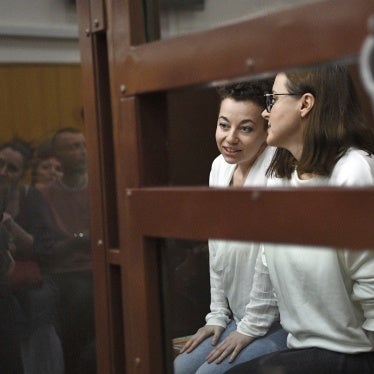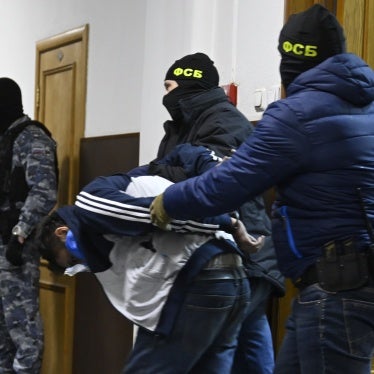Dear Member of Parliament,
We write in advance of Parliament's debate on the renewal of the control order regime under sections 1 through 9 of the Prevention of Terrorism Act 2005. It is our view that the power to impose control orders should not be renewed unless they are accompanied by significantly improved statutory safeguards. In this letter we detail our concerns and present our recommendations for bringing the control order regime in line with the United Kingdom's international human rights obligations.
The Prevention of Terrorism Act 2005 created the control order regime after the House of Lords struck down the policy of indefinite detention of foreign terrorism suspects. As you know, the Act gives the Secretary of State the authority to impose two kinds of control orders. The "non-derogating orders" are supposed to impose restrictions that fall short of deprivation of liberty and do not require the United Kingdom to declare a state of emergency and derogate from article 5 of the European Convention of Human Rights (ECHR) guaranteeing liberty and security of the person. Even if the restrictions these orders impose are not treated as deprivation of liberty (an issue which is currently before the European Court of Human Rights) these orders nonetheless seriously restrict the enjoyment of other fundamental ECHR rights, including freedom of movement, freedom of association, freedom of expression, and the right to privacy and family life. It is our understanding that 38 people have been subject to non-derogating control orders since the Act entered into effect; 15 people are currently living under control orders.
Derogating control orders impose conditions amounting to house arrest, and would require a prior declaration of a public emergency and a derogation from ECHR article 5. The UK's previous derogation from article 5 linked to indefinite detention was struck down by the Law Lords in December 2004 as a violation of human rights law. To date no derogating control order has been adopted. A fresh declaration of an emergency and a derogation from ECHR article 5 would be a very serious step, which no other European country, many of whom face serious terrorism threats, has felt necessary to take.
Although, as noted above, non-derogating control orders should not impose restrictions that deprive the controlee of liberty, the courts have quashed a number of orders because the restrictions taken as a whole were incompatible with ECHR article 5. An acceptable maximum daily limit on the curfew that can be imposed as part of a control order, in combination with other restrictions, is still the subject of considerable debate and an appeal pending before the European Court. AF, a dual UK/Libyan national who has been living under control orders for almost three years, has applied to the European Court of Human Rights alleging, inter alia, that his 16-hour curfew and other serious restrictions amount cumulatively to unlawful deprivation of liberty.
Human Rights Watch expressed grave reservations about the current system of control orders when the Prevention of Terrorism Act 2005 was still under debate.[1] In our view, the procedure for the making, renewal, and appeal of control orders is incompatible with UK obligations under article 6 of the ECHR guaranteeing the right to a fair hearing.
We are particularly concerned that the Secretary of State may impose such restrictions for an indefinite period of time on the basis of a low standard of proof and secret evidence. Both the "reasonable suspicion" and "balance of probabilities" standards used for imposing, respectively, non-derogating and derogating control orders fall well short of the criminal standard of "beyond a reasonable doubt." It is our view that the serious restrictions on an individual's human rights that can be imposed through control orders make them functionally equivalent to the imposition of punishment upon the determination of a criminal charge. This view is reinforced by the fact that breach of a control order is a criminal offense punishable upon conviction by up to five years imprisonment and/or a fine.
We are deeply concerned that the current system undermines the right to an effective defense, the principle of equality of arms, and the presumption of innocence. The scope for judicial review does not allow for a full adversarial proceeding in which the evidence upon which the order was based may be properly contested. Controlees and their lawyers are excluded from court when secret evidence is considered. Their interests are instead represented by security-cleared lawyers appointed on their behalf. These "special advocates" may not communicate with controlees once closed materials have been served or take specific instructions from them.[2]
The reliance on secret evidence and the system of special advocates is the subject of continuing legal challenges. In October 2007, the Law Lords ruled in the case of MB and AF that control orders based solely on secret evidence violate the right to a fair hearing.[3] In a bundle of four cases decided in October 2008, however, the Court of Appeal interpreted the Law Lords judgment to mean that there is no "irreducible minimum of disclosure" necessary to secure a fair hearing, and that proceedings in which even the entire case is contained in closed materials may be considered fair if overall the controlee has been afforded a sufficient and substantial measure of procedural protection.[4] The Law Lords will hear the appeals against this decision, in the cases of AE, AF, and AN, beginning on March 2.[5]
On February 19, the European Court of Human Rights found that the UK had violated article 5(4) in respect of four men held in indefinite detention under Part IV of ATCSA because the men had not had been in a position effectively to challenge the allegations against them during the SIAC proceedings.[6] The Court took the unequivocal view that special advocates could only perform their role effectively when detainees were provided sufficient information about the allegations against them, and able to give meaningful instructions to the advocate.[7] Proceedings in which the decision to uphold or maintain detention is based solely or to a decisive degree on closed material, not disclosed to the detainee, are to be considered unfair. It is entirely likely that the European Court of Human Rights will hear complaints against the UK alleging ECHR violations in respect to the use of special advocates in control order proceedings.
Effective use of the criminal justice system is the appropriate way to deal with those suspected of involvement in terrorism. While the Law Lords have taken the view that the absence of a realistic prospect of prosecution is not a necessary pre-condition for imposing a control order, they interpret the Prevention of Terrorism Act to impose an obligation on the Secretary of State to keep the possibility of prosecution under review.[8] While we are aware that a system is in place for such review, we note that to date no individual subject to control orders has been prosecuted except for breaches of the conditions of the orders themselves.
It is particularly striking, given the government's endorsement of prosecution as the "preferred approach," that the ban on the admissibility of intercept evidence in court remains in place. There is broad consensus that this archaic ban is a disproportionate response to a genuine concern over disclosure of intelligence sources and methods, and that removal of the ban would facilitate the prosecution of terrorism suspects. In his recently published fourth report on control orders, Independent Reviewer of Terrorism Legislation Lord Carlile concludes that the use of intercept evidence in criminal proceedings "has the potential for reducing the number of control orders."[9] Lifting the ban on intercept evidence, combined with improved statutory obligations to ensure that prospects for prosecution of controlees are a matter of systematic and serious review, would demonstrate the government's genuine commitment to using the criminal justice system instead of administrative measures.
Control orders were originally envisioned as a temporary measure; yet this will be the fourth renewal of such powers. That control orders appear to have become a permanent state of affairs underscores the importance of robust statutory safeguards. Human Rights Watch believes the following minimum safeguards are necessary:
- Restrictions should be imposed by a court and only through a process in which credible evidence of their necessity is provided to the court and the person subject to the order;
- The criminal standard of proof ("beyond a reasonable doubt") should be applied;
- There must be appropriate access to meaningful appeal and review, including access by controlees and their lawyers to sufficient evidence to ensure a substantial measure of procedural protection;
- Systematic and periodic review of the prospects for prosecution of controlees should be a statutory obligation. The determination of these reviews should be public.
- Due regard must be given upon the making of a control order (and subsequently upon its review by the courts) to ensure that the cumulative effect of restrictions, including but not limited to the hours of curfew, is not tantamount to deprivation of liberty.
- Control orders should be time limited and open to rescission and amendment of conditions on the presentation of new evidence.
Counterterrorism measures that violate human rights undermine the government's ability to win the battle of ideas that is central to long-term success in fighting terrorism. They erode public trust in law enforcement and security services, and alienate communities whose cooperation is critical in the fight against terrorism. We urge you to seize this opportunity to amend the control order legislative framework to ensure compatibility with the UK's international human rights obligations
Yours sincerely,
Holly Cartner
Executive Director
Europe and Central Asia Division
Tom Porteous
London Director
[1] For a detailed exposition of our concerns, see Human Rights Watch, Commentary on Prevention of Terrorism Bill 2005, March 2005, https://www.hrw.org/backgrounder/eca/uk0305/.
[2] The special advocate may apply for leave to communicate with the controlee or his lawyer, but this communication is not legally privileged.
[3] Secretary of State for the Home Department v MB and AF [2007] UKHL 46 [2008] AC1 AC400.
[4] Secretary of State for the Home Department v AF; Same v AM; Same v AN; Same v AE [2008] EWCA Civ 1148; [2008] WLR (D) 320 Judgment of 17 October 2008.
[5] As noted earlier, AF has also filed a complaint with the European Court of Human Rights, alleging violations of articles 5 and 6. That complaint is pending an admissibility decision.
[6] European Court of Human Rights, A and Others v. the United Kingdom, Judgment, February 19, 2009.
[7] Ibid., para. 220.
[8] Secretary of State for the Home Department v E [2007] UKHL 47.
[9] Fourth Report of the Independent Reviewer Pursuant to Section 14(3) of the Prevention of Terrorism Act 2005, 3 February 2009, Para. 47.








